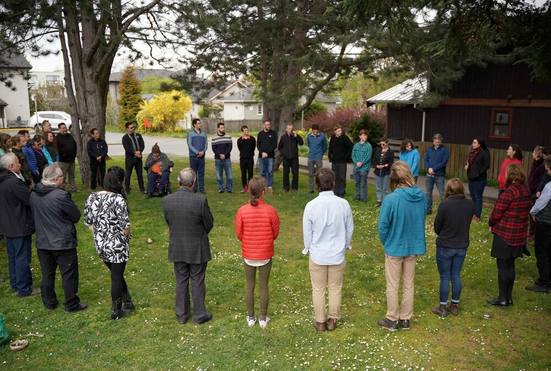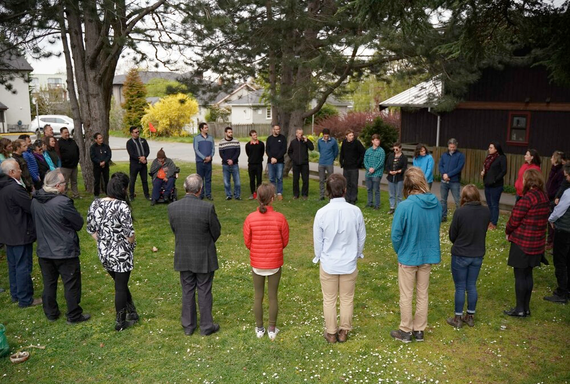The Wii Baba Mose Maamiwi program ran from 2021-2022 and is currently dormant. If you want to be updated about new intakes for this or any of our youth programs, you can subscribe to our newsletter at the bottom of this page. Miigwetch!
Le français suivra
Wii Baba Mose Maamiwi | We Walk the Path Together
How youth can unite Indigenous and Western cultures through Ethical Space
Join fellow youth over the next five months to participate in five online webinars paired with discussions, where you will hear from leading thinkers as well as practice how you can work together respectfully across multiple cultures towards a just future. There will also be an online workshop with a hands-on component where participants will braid sweetgrass together! The cost of participation, including a special mailed package with materials for the sweetgrass workshop, is covered for Indigenous and non-Indigenous youth aged 14-25 across Canada.
The program kicked-off at The Healing Place on October 14 where we marked the first anniversary of a cross-cultural project implemented within the framework taught through this program. Once you’re registered, you will have the opportunity to watch this event as an introduction to the program.
The workshop series will officially launch November 1 with a live webinar from 7-9pm EST presented by Rick Hill Sr., who will share his insights into the origins of what is now known as Canada through the lens of oral histories, wampum belts and treaties.
A certificate will be available to those who complete the program, and 5 volunteer hours can be approved for participation in the program discussions.
The program kicked-off at The Healing Place on October 14 where we marked the first anniversary of a cross-cultural project implemented within the framework taught through this program. Once you’re registered, you will have the opportunity to watch this event as an introduction to the program.
The workshop series will officially launch November 1 with a live webinar from 7-9pm EST presented by Rick Hill Sr., who will share his insights into the origins of what is now known as Canada through the lens of oral histories, wampum belts and treaties.
A certificate will be available to those who complete the program, and 5 volunteer hours can be approved for participation in the program discussions.
Workshops and Discussions:
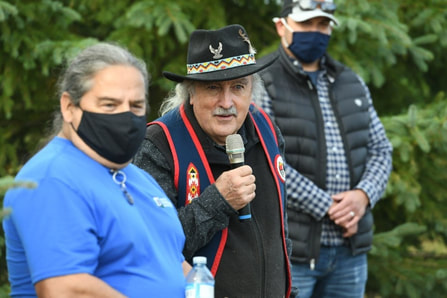
Kickoff Event:
The program kicked-off at The Healing Place on October 14 where we marked the first anniversary of a cross-cultural project implemented within the framework taught through this program. Once you’re registered, you will have the opportunity to watch this event as an introduction to the program.
“The Healing Place | Tsi Tehshakotitsénhtha | Endaji mino-pimaadizi | Lieu de guérison” was conceived of and planted by a collective of Indigenous and non-Indigenous partners in Ethical Space, for gathering with intention at the intersection of connections to land, ecological restoration, as well as truth and reconciliation. We know that planting is an act of reconciliation; bringing together First Peoples, Canadians and creation, and cultivating relationships out of mutual respect. We see this space as impactful to current discoveries of unmarked graves on residential school properties across Turtle Island and are making the call for healing amongst all our relations.
Live Online Presentations Paired with Facilitated Discussions:
Restoring History
November 1
Featuring: Rick Hill
A history of wampum belts and treaties will be shared in the context of Indigenous and Western perspectives.
Calls to Action and Modern Relations
December 6
Featuring: Dr. Dan Longboat
A recent history of calls to change our course (including the Canadian constitution, the UNDRIP, the 94 Calls to Action, the Earth Summit and resulting conventions on climate change, biological diversity and desertification) will be shared for discussion.
Thinking at the Intersection: A Recent Application of Ethical Space While Working to Meet Canada’s International Biodiversity Targets
January 10
Featuring: Albert Marshall
A discussion of the origins of the Ethical Space concept, what it is, and its use during recent efforts to protect biodiversity.
Walking in Beauty: Learning from Failure and Success
February 7
Feauturing: Larry McDermott, Pamela Perreault, and Augusta Lipscombe
A discussion of lessons learned through recent applications of Ethical Space and what it means to accommodate and work together.
Where We Go Now
March 7
Featuring: Abraham Francis
A discussion regarding dynamic interpretation and visions for the future.
The program kicked-off at The Healing Place on October 14 where we marked the first anniversary of a cross-cultural project implemented within the framework taught through this program. Once you’re registered, you will have the opportunity to watch this event as an introduction to the program.
“The Healing Place | Tsi Tehshakotitsénhtha | Endaji mino-pimaadizi | Lieu de guérison” was conceived of and planted by a collective of Indigenous and non-Indigenous partners in Ethical Space, for gathering with intention at the intersection of connections to land, ecological restoration, as well as truth and reconciliation. We know that planting is an act of reconciliation; bringing together First Peoples, Canadians and creation, and cultivating relationships out of mutual respect. We see this space as impactful to current discoveries of unmarked graves on residential school properties across Turtle Island and are making the call for healing amongst all our relations.
Live Online Presentations Paired with Facilitated Discussions:
Restoring History
November 1
Featuring: Rick Hill
A history of wampum belts and treaties will be shared in the context of Indigenous and Western perspectives.
Calls to Action and Modern Relations
December 6
Featuring: Dr. Dan Longboat
A recent history of calls to change our course (including the Canadian constitution, the UNDRIP, the 94 Calls to Action, the Earth Summit and resulting conventions on climate change, biological diversity and desertification) will be shared for discussion.
Thinking at the Intersection: A Recent Application of Ethical Space While Working to Meet Canada’s International Biodiversity Targets
January 10
Featuring: Albert Marshall
A discussion of the origins of the Ethical Space concept, what it is, and its use during recent efforts to protect biodiversity.
Walking in Beauty: Learning from Failure and Success
February 7
Feauturing: Larry McDermott, Pamela Perreault, and Augusta Lipscombe
A discussion of lessons learned through recent applications of Ethical Space and what it means to accommodate and work together.
Where We Go Now
March 7
Featuring: Abraham Francis
A discussion regarding dynamic interpretation and visions for the future.
Speakers:
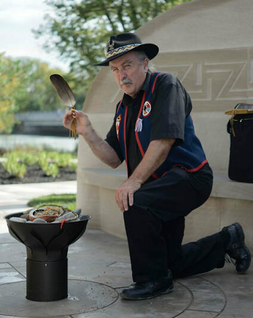
Larry McDermott
Elder Larry McDermott is Algonquin from Shabot Obaadjiwan First Nation, and is the Executive Director of Plenty Canada, an Indigenous NGO. Larry is currently a member of numerous organizations including the Indigenous International Forum for Biodiversity and the Eastern Ontario First Nations Working Group. Larry attended the 1992 Earth Summit that launched the treaty conventions on climate change and biodiversity, and subsequent meetings. Larry served as an Elder to the Canada Pathway to Target 1 process, under a system inclusive of Indigenous and Western knowledge systems and governance. Larry also served as a comprehensive claim representative for Shabot Obaadjiwan First Nation, is a certified tree marker and butternut assessor, and holds other environmental certifications. He has also received an Honorary Doctorate of Laws from the University of Guelph. Larry was a humble student for many years of the late Algonquin Elder, Grandfather William Commanda, who created the Circle of All Nations organization.
Elder Larry McDermott is Algonquin from Shabot Obaadjiwan First Nation, and is the Executive Director of Plenty Canada, an Indigenous NGO. Larry is currently a member of numerous organizations including the Indigenous International Forum for Biodiversity and the Eastern Ontario First Nations Working Group. Larry attended the 1992 Earth Summit that launched the treaty conventions on climate change and biodiversity, and subsequent meetings. Larry served as an Elder to the Canada Pathway to Target 1 process, under a system inclusive of Indigenous and Western knowledge systems and governance. Larry also served as a comprehensive claim representative for Shabot Obaadjiwan First Nation, is a certified tree marker and butternut assessor, and holds other environmental certifications. He has also received an Honorary Doctorate of Laws from the University of Guelph. Larry was a humble student for many years of the late Algonquin Elder, Grandfather William Commanda, who created the Circle of All Nations organization.
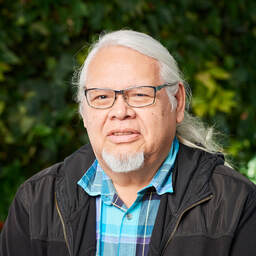
Rick Hill
Rick Hill is a citizen of the Beaver Clan of the Tuscarora Nation of the Haudenosaunee at Grand River. He holds a master’s degree in American Studies from the State University of New York (SUNY) at Buffalo. He was the Assistant Director for Public Programs at the National Museum of the American Indian, Smithsonian Institution; Museum Director at the Institute of American Indian Arts in Santa Fe, New Mexico; and Assistant Professor, Native American Studies, at SUNY Buffalo. He also served as Senior Project Coordinator for the Deyohahá:ge: Indigenous Knowledge Centre at Six Nations Polytechnic, Ohsweken, Ontario. Currently, he is the Indigenous Innovation Specialist at Mohawk College in Hamilton, Ontario. Rick is working with a group of historians on a book that will examine the history and legacy of the Mohawk Institute, the oldest Indian residential school in Canada.
Rick Hill is a citizen of the Beaver Clan of the Tuscarora Nation of the Haudenosaunee at Grand River. He holds a master’s degree in American Studies from the State University of New York (SUNY) at Buffalo. He was the Assistant Director for Public Programs at the National Museum of the American Indian, Smithsonian Institution; Museum Director at the Institute of American Indian Arts in Santa Fe, New Mexico; and Assistant Professor, Native American Studies, at SUNY Buffalo. He also served as Senior Project Coordinator for the Deyohahá:ge: Indigenous Knowledge Centre at Six Nations Polytechnic, Ohsweken, Ontario. Currently, he is the Indigenous Innovation Specialist at Mohawk College in Hamilton, Ontario. Rick is working with a group of historians on a book that will examine the history and legacy of the Mohawk Institute, the oldest Indian residential school in Canada.
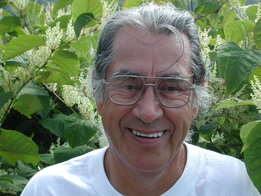
Albert Marshall
Albert Marshall is a highly respected and much loved Elder of the Mi’kmaw Nation; he lives in Eskasoni First Nation in Unama'ki (Cape Breton), Nova Scotia, and is a passionate advocate of cross-cultural understandings and healing and of our human responsibilities to care for all creatures and our Earth Mother. He is the “designated voice” with respect to environmental issues for the Mi’kmaw Elders of Unama’ki and he sits on various committees that develop and guide collaborative initiatives and understandings in natural resource management or that serve First Nations’ governance issues, or that otherwise work towards ethical environmental, social and economic practices. He and his late wife, Murdena, coined the phrase Etuaptmumk / Two-Eyed Seeing as a guiding principle for collaborative work which encourages learning to see from one eye with the strengths of Indigenous knowledges and ways of knowing, and from the other eye with the strengths of Western knowledges and ways of knowing … and learning to use both these eyes together, for the benefit of all. Albert was an inmate of the Indian Residential School in Shubenacadie, Nova Scotia, for much of his childhood and teenage years. He was profoundly affected by this experience and it has led him on a lifelong quest to connect with and understand both the culture he was removed from and the culture he was forced into, and to help these cultures find ways to live in mutual respect of each other’s strengths and ways.
Albert Marshall is a highly respected and much loved Elder of the Mi’kmaw Nation; he lives in Eskasoni First Nation in Unama'ki (Cape Breton), Nova Scotia, and is a passionate advocate of cross-cultural understandings and healing and of our human responsibilities to care for all creatures and our Earth Mother. He is the “designated voice” with respect to environmental issues for the Mi’kmaw Elders of Unama’ki and he sits on various committees that develop and guide collaborative initiatives and understandings in natural resource management or that serve First Nations’ governance issues, or that otherwise work towards ethical environmental, social and economic practices. He and his late wife, Murdena, coined the phrase Etuaptmumk / Two-Eyed Seeing as a guiding principle for collaborative work which encourages learning to see from one eye with the strengths of Indigenous knowledges and ways of knowing, and from the other eye with the strengths of Western knowledges and ways of knowing … and learning to use both these eyes together, for the benefit of all. Albert was an inmate of the Indian Residential School in Shubenacadie, Nova Scotia, for much of his childhood and teenage years. He was profoundly affected by this experience and it has led him on a lifelong quest to connect with and understand both the culture he was removed from and the culture he was forced into, and to help these cultures find ways to live in mutual respect of each other’s strengths and ways.
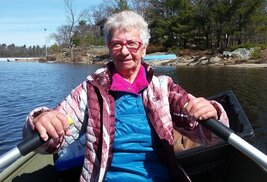
Marilyn Capreol
Elder Marilyn Capreol is Anishinaabe from Shawanaga First Nation in Ontario and is a founding member of the Conservation through Reconciliation Elder’s Lodge. Marilyn was raised on the waters of Georgian Bay, which is where she is joining us from today. Throughout her life she has been an active volunteer: for many years she was the President of the Circle of Directors for Na Me Res, a shelter for Indigenous men in Toronto. She is also involved with the Georgian Bay Biosphere reserve and is a member of the Indigenous Circle for the Canadian Biosphere Reserves Association.
Elder Marilyn Capreol is Anishinaabe from Shawanaga First Nation in Ontario and is a founding member of the Conservation through Reconciliation Elder’s Lodge. Marilyn was raised on the waters of Georgian Bay, which is where she is joining us from today. Throughout her life she has been an active volunteer: for many years she was the President of the Circle of Directors for Na Me Res, a shelter for Indigenous men in Toronto. She is also involved with the Georgian Bay Biosphere reserve and is a member of the Indigenous Circle for the Canadian Biosphere Reserves Association.
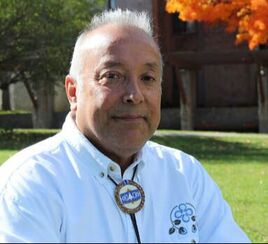
Dr. Dan Longboat
Dr. Dan Longboat - Roronhiakewen (He Clears the Sky) - is a Turtle Clan member of the Mohawk Nation and a citizen of the Rotinonshón:ni (Haudenosaunee - People of the Longhouse), originally from Ohsweken - the Six Nations community on the Grand River. He is currently on leave from Trent University where he is an Associate Professor in the Chanie Wenjack School for Indigenous Studies and Acting Director of the newly formed Indigenous Environmental Institute. Dan was also the founding director of the Indigenous Environmental Science/Studies Program. Dan has also taught at several other post-secondary institutions in Ontario.
Dan’s Ph.D. is in Environmental Studies at York University with his dissertation (The Haudenosaunee Archipelago: The Nature of Bio-Cultural Restoration and Revitalization) receiving the York Award of Excellence in Scholarship in 2009. While speaking on Indigenous issues across Turtle Island, he stresses the importance of learning from Elders and Knowledge Holders as the critical foundation for Indigenous identity, vision and life purposes.
Dr. Dan Longboat - Roronhiakewen (He Clears the Sky) - is a Turtle Clan member of the Mohawk Nation and a citizen of the Rotinonshón:ni (Haudenosaunee - People of the Longhouse), originally from Ohsweken - the Six Nations community on the Grand River. He is currently on leave from Trent University where he is an Associate Professor in the Chanie Wenjack School for Indigenous Studies and Acting Director of the newly formed Indigenous Environmental Institute. Dan was also the founding director of the Indigenous Environmental Science/Studies Program. Dan has also taught at several other post-secondary institutions in Ontario.
Dan’s Ph.D. is in Environmental Studies at York University with his dissertation (The Haudenosaunee Archipelago: The Nature of Bio-Cultural Restoration and Revitalization) receiving the York Award of Excellence in Scholarship in 2009. While speaking on Indigenous issues across Turtle Island, he stresses the importance of learning from Elders and Knowledge Holders as the critical foundation for Indigenous identity, vision and life purposes.
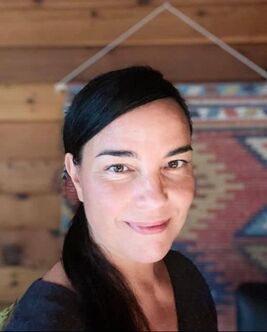
Pamela Perreault
Pamela Perreault is a member of Garden River First Nation in Ontario. Her academic and consulting careers have taken her across Canada, and around the world in pursuit of knowledge and understanding of Indigenous Peoples’ connection with forested landscapes. She has worked with First Nation governments, regional organizations, NGOs and state governments on projects related to resource policy development and implementation, land-use planning, Indigenous housing, community-based research and the implementation of the UN Declaration on the Rights of Indigenous Peoples (UNDRIP) and Free, Prior and Informed Consent (FPIC) in forest certification.
Pamela has been a research fellow at the University of Auckland NZ, a Member of the Forest Sciences Board of the BC Ministry of Forests, a Program Coordinator in the Faculty of Forestry at UBC, and a university instructor on Haida Gwaii and at Algoma University. She began her academic career in biology, specializing in freshwater ecology at the University of Waterloo. She has a Masters of Science in Forest Management from UBC. She is co-editor of the book Aboriginal Peoples and Forest Lands in Canada (UBC Press 2013). In 2014, Pamela returned to her home community of Garden River First Nation with her husband and son where she served as an elected Council member for a 2-year term. Today, she happily lives and works between Vancouver Island in British Columbia and Garden River First Nation.
Pamela Perreault is a member of Garden River First Nation in Ontario. Her academic and consulting careers have taken her across Canada, and around the world in pursuit of knowledge and understanding of Indigenous Peoples’ connection with forested landscapes. She has worked with First Nation governments, regional organizations, NGOs and state governments on projects related to resource policy development and implementation, land-use planning, Indigenous housing, community-based research and the implementation of the UN Declaration on the Rights of Indigenous Peoples (UNDRIP) and Free, Prior and Informed Consent (FPIC) in forest certification.
Pamela has been a research fellow at the University of Auckland NZ, a Member of the Forest Sciences Board of the BC Ministry of Forests, a Program Coordinator in the Faculty of Forestry at UBC, and a university instructor on Haida Gwaii and at Algoma University. She began her academic career in biology, specializing in freshwater ecology at the University of Waterloo. She has a Masters of Science in Forest Management from UBC. She is co-editor of the book Aboriginal Peoples and Forest Lands in Canada (UBC Press 2013). In 2014, Pamela returned to her home community of Garden River First Nation with her husband and son where she served as an elected Council member for a 2-year term. Today, she happily lives and works between Vancouver Island in British Columbia and Garden River First Nation.
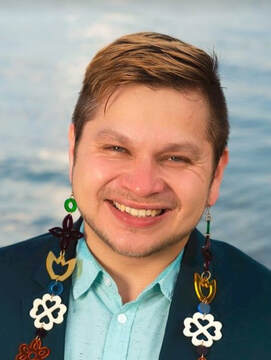
Abraham Francis
Abraham Francis has a BSc in Microbiology, 2014, and MSc in Natural Resources, 2019, from Cornell University. His past experiences include community empowerment, engagement, and research with the Mohawk Council of Akwesasne and a variety of other community-based organizations. His Masters’ Thesis focused on applied research to develop a biocultural land stewardship strategy for existing and newly settled Native American Land Claims on the St. Regis Mohawk Reservation, Akwesasne. Currently, he works as the Environmental Science Officer for the Mohawk Council of Akwesasne – Environment Program. The position allows him to develop and implement projects that are inspired and directed by community needs as well as influenced by his research interests. His research interests are at the intersection of environmental studies, Indigenous methodologies, community engagement, education, health, social services, law, and cultural foundations as a means for empowerment and healing within Indigenous Communities.
Abraham Francis has a BSc in Microbiology, 2014, and MSc in Natural Resources, 2019, from Cornell University. His past experiences include community empowerment, engagement, and research with the Mohawk Council of Akwesasne and a variety of other community-based organizations. His Masters’ Thesis focused on applied research to develop a biocultural land stewardship strategy for existing and newly settled Native American Land Claims on the St. Regis Mohawk Reservation, Akwesasne. Currently, he works as the Environmental Science Officer for the Mohawk Council of Akwesasne – Environment Program. The position allows him to develop and implement projects that are inspired and directed by community needs as well as influenced by his research interests. His research interests are at the intersection of environmental studies, Indigenous methodologies, community engagement, education, health, social services, law, and cultural foundations as a means for empowerment and healing within Indigenous Communities.
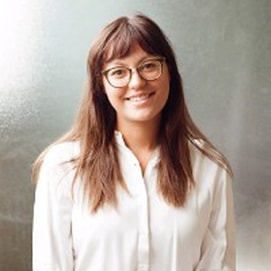
Augusta Lipscombe
Augusta Lipscombe grew up in a small hamlet outside of Smiths Falls, Ontario where she had the opportunity to develop a deep appreciation for the environment. Her passion for nature prompted her to pursue a Bachelor of Science in Marine and Freshwater Biology from the University of Guelph and a Master of Marine Management from Dalhousie University, during which she discovered an enthusiasm for science communication. For the past five years, Augusta has worked with non-profit organizations and educational institutions to translate knowledge into engaging content for all audiences. Augusta had the privilege of being a part of the Reconciliation and Climate Change Planting Working Group while working at Forests Ontario, where she got the opportunity to collaborate with project partners on realizing the vision of The Healing Place and learn first hand the importance and power of creating ethical space. She is currently the Research and Communications Specialist with TRANSFORM Heart Failure Strategic Initiative, University of Toronto.
Augusta Lipscombe grew up in a small hamlet outside of Smiths Falls, Ontario where she had the opportunity to develop a deep appreciation for the environment. Her passion for nature prompted her to pursue a Bachelor of Science in Marine and Freshwater Biology from the University of Guelph and a Master of Marine Management from Dalhousie University, during which she discovered an enthusiasm for science communication. For the past five years, Augusta has worked with non-profit organizations and educational institutions to translate knowledge into engaging content for all audiences. Augusta had the privilege of being a part of the Reconciliation and Climate Change Planting Working Group while working at Forests Ontario, where she got the opportunity to collaborate with project partners on realizing the vision of The Healing Place and learn first hand the importance and power of creating ethical space. She is currently the Research and Communications Specialist with TRANSFORM Heart Failure Strategic Initiative, University of Toronto.
Wii Baba Mose Maamiwi | On marche ensemble sur le chemin
Comment les jeunes peuvent unir les culture Indigènes et occidentales grâce à l’Espace Éthique
Au cours des cinq prochains mois, rejoignez d'autres jeunes pour participer à cinq webinaires en ligne avec des discussions, où vous entendrez des penseurs de premier plan et vous mettrez en pratique la manière dont vous pouvez travailler ensemble de manière respectueuse à travers de multiples cultures pour un avenir juste. Il y aura également un atelier en ligne avec une composante pratique où les participants tresseront ensemble du foin d'odeur ! Le coût de la participation, y compris un paquet spécial envoyé par la poste avec le matériel pour l'atelier sur le foin d'odeur, est couvert pour les jeunes indigènes et non indigènes âgés de 14 à 25 ans à travers le Canada.
Le programme a débuté à The Healing Place le 14 octobre, où nous avons marqué le premier anniversaire d'un projet interculturel mis en œuvre dans le cadre enseigné par ce programme. Une fois que vous serez inscrit, vous aurez la possibilité de regarder cet événement comme une introduction au programme.
La série d'ateliers débutera officiellement le 1er novembre par un webinaire en direct, de 19 h à 21 h, présenté par Rick Hill Sr. qui partagera ses connaissances sur les origines de ce que l'on appelle aujourd'hui le Canada à travers le prisme des histoires orales, des ceintures wampum et des traités.
Un certificat sera remis à ceux qui auront suivi le programme, et 5 heures de bénévolat pourront être approuvées pour la participation aux discussions du programme.
Le programme a débuté à The Healing Place le 14 octobre, où nous avons marqué le premier anniversaire d'un projet interculturel mis en œuvre dans le cadre enseigné par ce programme. Une fois que vous serez inscrit, vous aurez la possibilité de regarder cet événement comme une introduction au programme.
La série d'ateliers débutera officiellement le 1er novembre par un webinaire en direct, de 19 h à 21 h, présenté par Rick Hill Sr. qui partagera ses connaissances sur les origines de ce que l'on appelle aujourd'hui le Canada à travers le prisme des histoires orales, des ceintures wampum et des traités.
Un certificat sera remis à ceux qui auront suivi le programme, et 5 heures de bénévolat pourront être approuvées pour la participation aux discussions du programme.
Ateliers et discussions:
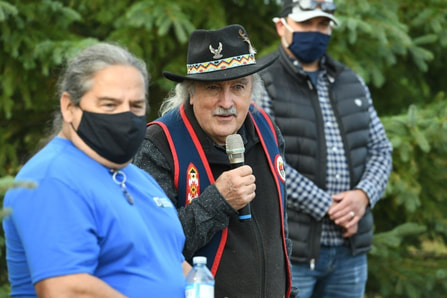
Premier événement:
Le programme a débuté à The Healing Place le 14 octobre, où nous avons marqué le premier anniversaire d'un projet interculturel mis en œuvre dans le cadre enseigné par ce programme. Une fois que vous serez inscrit, vous aurez la possibilité de regarder cet événement comme une introduction au programme.
"The Healing Place | Tsi Tehshakotitsénhtha | Endaji mino-pimaadizi | Lieu de guérison" a été conçu et planté par un collectif de partenaires autochtones et non autochtones de l'Espace éthique, pour se rassembler avec intention à l'intersection des liens avec la terre, la restauration écologique, ainsi que la vérité et la réconciliation. Nous savons que planter est un acte de réconciliation, qui rassemble les Premières Nations, les Canadiens et la création, et qui cultive des relations fondées sur le respect mutuel. Nous considérons que cet espace a un impact sur les découvertes actuelles de tombes non marquées sur les propriétés des pensionnats de Turtle Island et nous lançons un appel à la guérison de toutes nos relations.
Présentation en ligne en direct, associée à des discussions animées:
Restaurer l'histoire
1 novembre
Avec Rick Hill
Une histoire des ceintures wampum et des traités sera partagée dans le contexte des perspectives indigènes et occidentales.
Appels à l'action et relations modernes
6 décembre
Avec Dr. Dan Longboat
Une histoire récente des appels à changer de cap (y compris la constitution canadienne, l'UNDRIP, les 94 appels à l'action, le Sommet de la Terre et les conventions qui en découlent sur le changement climatique, la diversité biologique et la désertification) sera présentée pour discussion.
Penser à l'intersection : Une application récente de l'espace éthique tout en travaillant pour atteindre les objectifs internationaux du Canada en matière de biodiversité
10 janvier
Avec Albert Marshall
Une discussion sur les origines du concept d'espace éthique, sur ce qu'il est, et sur son utilisation dans le cadre d'efforts récents pour protéger la biodiversité.
Marcher dans la beauté : Apprendre des échecs et des succès
7 février
Avec Larry McDermott, Pamela Perreault, et Augusta Lipscombe
Une discussion sur les leçons tirées des récentes applications de l'espace éthique et sur ce que cela signifie de s'adapter et de travailler ensemble.
Where We Go Now
7 mars
Avec Abraham Francis
Une discussion sur l'interprétation dynamique et les visions de l'avenir.
Le programme a débuté à The Healing Place le 14 octobre, où nous avons marqué le premier anniversaire d'un projet interculturel mis en œuvre dans le cadre enseigné par ce programme. Une fois que vous serez inscrit, vous aurez la possibilité de regarder cet événement comme une introduction au programme.
"The Healing Place | Tsi Tehshakotitsénhtha | Endaji mino-pimaadizi | Lieu de guérison" a été conçu et planté par un collectif de partenaires autochtones et non autochtones de l'Espace éthique, pour se rassembler avec intention à l'intersection des liens avec la terre, la restauration écologique, ainsi que la vérité et la réconciliation. Nous savons que planter est un acte de réconciliation, qui rassemble les Premières Nations, les Canadiens et la création, et qui cultive des relations fondées sur le respect mutuel. Nous considérons que cet espace a un impact sur les découvertes actuelles de tombes non marquées sur les propriétés des pensionnats de Turtle Island et nous lançons un appel à la guérison de toutes nos relations.
Présentation en ligne en direct, associée à des discussions animées:
Restaurer l'histoire
1 novembre
Avec Rick Hill
Une histoire des ceintures wampum et des traités sera partagée dans le contexte des perspectives indigènes et occidentales.
Appels à l'action et relations modernes
6 décembre
Avec Dr. Dan Longboat
Une histoire récente des appels à changer de cap (y compris la constitution canadienne, l'UNDRIP, les 94 appels à l'action, le Sommet de la Terre et les conventions qui en découlent sur le changement climatique, la diversité biologique et la désertification) sera présentée pour discussion.
Penser à l'intersection : Une application récente de l'espace éthique tout en travaillant pour atteindre les objectifs internationaux du Canada en matière de biodiversité
10 janvier
Avec Albert Marshall
Une discussion sur les origines du concept d'espace éthique, sur ce qu'il est, et sur son utilisation dans le cadre d'efforts récents pour protéger la biodiversité.
Marcher dans la beauté : Apprendre des échecs et des succès
7 février
Avec Larry McDermott, Pamela Perreault, et Augusta Lipscombe
Une discussion sur les leçons tirées des récentes applications de l'espace éthique et sur ce que cela signifie de s'adapter et de travailler ensemble.
Where We Go Now
7 mars
Avec Abraham Francis
Une discussion sur l'interprétation dynamique et les visions de l'avenir.
Les orateurs:
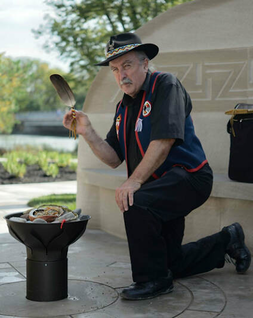
Larry McDermott
L'aîné Larry McDermott est un Algonquin de la Première Nation Shabot Obaadjiwan, et il est le directeur exécutif de Plenty Canada, une ONG autochtone. Larry est actuellement membre de nombreuses reseaux, dont le Forum international autochtone pour la biodiversité et le Groupe de travail des Premières nations de l'Est de l'Ontario. Larry a assisté au Sommet de la Terre de 1992 qui a lancé les conventions de traités sur le changement climatique et la biodiversité, ainsi qu'aux réunions ultérieures. Larry a agi à titre d'aîné dans le cadre du processus Canada Pathway to Target 1, en vertu d'un système incluant les systèmes de connaissances et la gouvernance autochtones et occidentaux. Larry a également été représentant de la revendication globale pour la Première nation Shabot Obaadjiwan, est un marqueur d'arbres et un évaluateur de noyer cendré certifié, et détient d'autres certifications environnementales. Il a également reçu un doctorat honorifique en droit de l'Université de Guelph. Larry a été pendant de nombreuses années l'humble étudiant de feu l'aîné algonquin, le grand-père William Commanda, qui a créé l'organisation Circle of All Nations.
L'aîné Larry McDermott est un Algonquin de la Première Nation Shabot Obaadjiwan, et il est le directeur exécutif de Plenty Canada, une ONG autochtone. Larry est actuellement membre de nombreuses reseaux, dont le Forum international autochtone pour la biodiversité et le Groupe de travail des Premières nations de l'Est de l'Ontario. Larry a assisté au Sommet de la Terre de 1992 qui a lancé les conventions de traités sur le changement climatique et la biodiversité, ainsi qu'aux réunions ultérieures. Larry a agi à titre d'aîné dans le cadre du processus Canada Pathway to Target 1, en vertu d'un système incluant les systèmes de connaissances et la gouvernance autochtones et occidentaux. Larry a également été représentant de la revendication globale pour la Première nation Shabot Obaadjiwan, est un marqueur d'arbres et un évaluateur de noyer cendré certifié, et détient d'autres certifications environnementales. Il a également reçu un doctorat honorifique en droit de l'Université de Guelph. Larry a été pendant de nombreuses années l'humble étudiant de feu l'aîné algonquin, le grand-père William Commanda, qui a créé l'organisation Circle of All Nations.
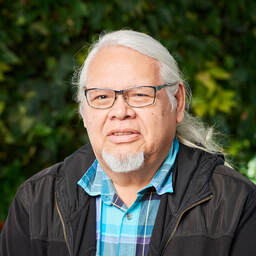
Rick Hill
Rick Hill est un citoyen du clan des castors de la nation Tuscarora des Haudenosaunee à Grand River. Il est titulaire d'une maîtrise en études américaines de l'université d'État de New York (SUNY) à Buffalo. Il a été directeur adjoint des programmes publics au National Museum of the American Indian, Smithsonian Institution, directeur de musée à l'Institute of American Indian Arts de Santa Fe, Nouveau-Mexique, et professeur adjoint d'études amérindiennes à la SUNY Buffalo. Il a également été coordinateur principal de projet pour le Deyohahá:ge : Indigenous Knowledge Centre à la Six Nations Polytechnic, à Ohsweken, en Ontario. Actuellement, il est le spécialiste de l'innovation autochtone au Mohawk College de Hamilton, en Ontario. Rick travaille avec un groupe d'historiens sur un livre qui examinera l'histoire et l'héritage du Mohawk Institute, le plus ancien pensionnat indien du Canada.
Rick Hill est un citoyen du clan des castors de la nation Tuscarora des Haudenosaunee à Grand River. Il est titulaire d'une maîtrise en études américaines de l'université d'État de New York (SUNY) à Buffalo. Il a été directeur adjoint des programmes publics au National Museum of the American Indian, Smithsonian Institution, directeur de musée à l'Institute of American Indian Arts de Santa Fe, Nouveau-Mexique, et professeur adjoint d'études amérindiennes à la SUNY Buffalo. Il a également été coordinateur principal de projet pour le Deyohahá:ge : Indigenous Knowledge Centre à la Six Nations Polytechnic, à Ohsweken, en Ontario. Actuellement, il est le spécialiste de l'innovation autochtone au Mohawk College de Hamilton, en Ontario. Rick travaille avec un groupe d'historiens sur un livre qui examinera l'histoire et l'héritage du Mohawk Institute, le plus ancien pensionnat indien du Canada.
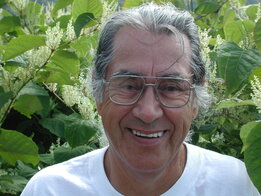
Albert Marshall
Albert Marshall est un aîné très respecté et très aimé de la nation mi'kmaq ; il vit dans la Première nation Eskasoni à Unama'ki (Cap-Breton), en Nouvelle-Écosse, et est un défenseur passionné de la compréhension et de la guérison interculturelles et de nos responsabilités humaines à l'égard de toutes les créatures et de notre mère la Terre. Il est la " voix désignée " en ce qui concerne les questions environnementales pour les aînés mi'kmaq d'Unama'ki et il siège à divers comités qui élaborent et orientent des initiatives de collaboration et des ententes en matière de gestion des ressources naturelles ou qui s'occupent des questions de gouvernance des Premières nations, ou encore qui œuvrent en faveur de pratiques environnementales, sociales et économiques éthiques. Lui et sa défunte épouse, Murdena, ont créé l'expression Etuaptmumk / Two-Eyed Seeing (voir à deux yeux) comme principe directeur pour le travail de collaboration qui encourage à apprendre à voir d'un œil avec les forces des connaissances et des modes de connaissance indigènes, et de l'autre œil avec les forces des connaissances et des modes de connaissance occidentaux... et à apprendre à utiliser ces deux yeux ensemble, pour le bénéfice de tous. Albert a été détenu au pensionnat indien de Shubenacadie, en Nouvelle-Écosse, pendant une grande partie de son enfance et de son adolescence. Cette expérience l'a profondément marqué et l'a conduit à chercher toute sa vie à se rapprocher et à comprendre à la fois la culture à laquelle il a été arraché et celle à laquelle il a été contraint, et à aider ces cultures à trouver des moyens de vivre dans le respect mutuel de leurs forces et de leurs modes de vie respectifs.
Albert Marshall est un aîné très respecté et très aimé de la nation mi'kmaq ; il vit dans la Première nation Eskasoni à Unama'ki (Cap-Breton), en Nouvelle-Écosse, et est un défenseur passionné de la compréhension et de la guérison interculturelles et de nos responsabilités humaines à l'égard de toutes les créatures et de notre mère la Terre. Il est la " voix désignée " en ce qui concerne les questions environnementales pour les aînés mi'kmaq d'Unama'ki et il siège à divers comités qui élaborent et orientent des initiatives de collaboration et des ententes en matière de gestion des ressources naturelles ou qui s'occupent des questions de gouvernance des Premières nations, ou encore qui œuvrent en faveur de pratiques environnementales, sociales et économiques éthiques. Lui et sa défunte épouse, Murdena, ont créé l'expression Etuaptmumk / Two-Eyed Seeing (voir à deux yeux) comme principe directeur pour le travail de collaboration qui encourage à apprendre à voir d'un œil avec les forces des connaissances et des modes de connaissance indigènes, et de l'autre œil avec les forces des connaissances et des modes de connaissance occidentaux... et à apprendre à utiliser ces deux yeux ensemble, pour le bénéfice de tous. Albert a été détenu au pensionnat indien de Shubenacadie, en Nouvelle-Écosse, pendant une grande partie de son enfance et de son adolescence. Cette expérience l'a profondément marqué et l'a conduit à chercher toute sa vie à se rapprocher et à comprendre à la fois la culture à laquelle il a été arraché et celle à laquelle il a été contraint, et à aider ces cultures à trouver des moyens de vivre dans le respect mutuel de leurs forces et de leurs modes de vie respectifs.
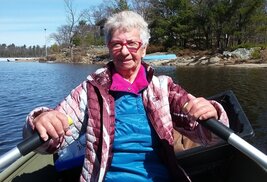
Marilyn Capreol
L'aînée Marilyn Capreol est une Anishinaabe de la Première nation Shawanaga, en Ontario, et elle est membre fondatrice de la loge des aînés de Conservation through Reconciliation. Marilyn a été élevée sur les eaux de la baie Georgienne, d'où elle nous rejoint aujourd'hui. Tout au long de sa vie, elle a été une bénévole active : pendant de nombreuses années, elle a été présidente du cercle des directeurs de Na Me Res, un refuge pour hommes autochtones à Toronto. Elle est également impliquée dans la réserve de biosphère de la baie Georgienne et est membre du cercle autochtone de l'Association canadienne des réserves de biosphère.
L'aînée Marilyn Capreol est une Anishinaabe de la Première nation Shawanaga, en Ontario, et elle est membre fondatrice de la loge des aînés de Conservation through Reconciliation. Marilyn a été élevée sur les eaux de la baie Georgienne, d'où elle nous rejoint aujourd'hui. Tout au long de sa vie, elle a été une bénévole active : pendant de nombreuses années, elle a été présidente du cercle des directeurs de Na Me Res, un refuge pour hommes autochtones à Toronto. Elle est également impliquée dans la réserve de biosphère de la baie Georgienne et est membre du cercle autochtone de l'Association canadienne des réserves de biosphère.
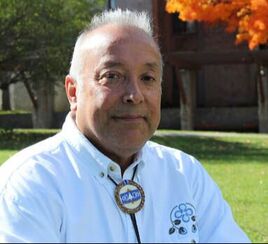
Dr. Dan Longboat
Dan Longboat - Roronhiakewen (Il nettoie le ciel) - est un membre du clan de la tortue de la nation mohawk et un citoyen de Rotinonshón:ni (Haudenosaunee - peuple de la maison longue), originaire d'Ohsweken - la communauté des Six Nations sur la Rivière Grand. Il est actuellement en congé de l'Université Trent, où il est professeur agrégé à la Chanie Wenjack School for Indigenous Studies et directeur par intérim de l'Indigenous Environmental Institute nouvellement créé. Dan a également été le directeur fondateur de l'Indigenous Environmental Science/Studies Program. Dan a également enseigné dans plusieurs autres établissements postsecondaires de l'Ontario.
Dan a obtenu son doctorat en études environnementales à l'Université York avec sa thèse (The Haudenosaunee Archipelago : The Nature of Bio-Cultural Restoration and Revitalization) a reçu le York Award of Excellence in Scholarship en 2009. Lorsqu'il s'exprime sur les questions autochtones à travers l'île de la Tortue, il souligne l'importance de l'apprentissage auprès des aînés et des détenteurs du savoir comme fondement essentiel de l'identité, de la vision et des objectifs de vie autochtones.
Dan Longboat - Roronhiakewen (Il nettoie le ciel) - est un membre du clan de la tortue de la nation mohawk et un citoyen de Rotinonshón:ni (Haudenosaunee - peuple de la maison longue), originaire d'Ohsweken - la communauté des Six Nations sur la Rivière Grand. Il est actuellement en congé de l'Université Trent, où il est professeur agrégé à la Chanie Wenjack School for Indigenous Studies et directeur par intérim de l'Indigenous Environmental Institute nouvellement créé. Dan a également été le directeur fondateur de l'Indigenous Environmental Science/Studies Program. Dan a également enseigné dans plusieurs autres établissements postsecondaires de l'Ontario.
Dan a obtenu son doctorat en études environnementales à l'Université York avec sa thèse (The Haudenosaunee Archipelago : The Nature of Bio-Cultural Restoration and Revitalization) a reçu le York Award of Excellence in Scholarship en 2009. Lorsqu'il s'exprime sur les questions autochtones à travers l'île de la Tortue, il souligne l'importance de l'apprentissage auprès des aînés et des détenteurs du savoir comme fondement essentiel de l'identité, de la vision et des objectifs de vie autochtones.
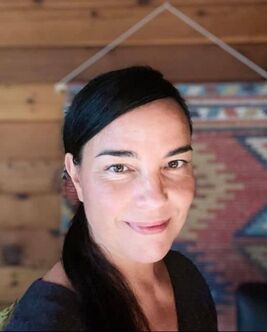
Pamela Perreault
Pamela Perreault est membre de la Première Nation de Garden River, en Ontario. Sa carrière universitaire et de consultante l'a amenée à parcourir le Canada et le monde à la recherche d'un savoir et d'une et de la compréhension du lien entre les peuples autochtones et les paysages forestiers. Elle a travaillé avec des gouvernements de Premières nations, des organisations régionales, des ONG et des gouvernements d'États sur projets liés à l'élaboration et à la mise en œuvre de politiques en matière de ressources, à la planification de l'utilisation des terres, à l'habitat autochtone, à la recherche communautaire et à la gestion des ressources naturelles, l'aménagement du territoire, le logement autochtone, la recherche communautaire et la mise en œuvre de la Déclaration des Nations Unies sur les droits des peuples autochtones des Nations Unies sur les droits des peuples autochtones (UNDRIP) et du consentement préalable, libre et éclairé (FPIC) dans la certification forestière certification forestière.
Pamela a été chargée de recherche à l'Université d'Auckland, en Nouvelle-Zélande, membre du Conseil des sciences forestières du ministère des Forêts de la Colombie-Britannique et membre de la Commission de l'environnement et du développement durable des sciences forestières du ministère des Forêts de la Colombie-Britannique, coordinatrice de programme à la faculté de foresterie de l'Université de la Colombie-Britannique et instructrice universitaire UBC, et enseignante universitaire à Haida Gwaii et à l'Université Algoma. Elle a commencé sa carrière universitaire en biologie, avec une spécialisation en écologie des eaux douces à l'Université de Waterloo. Elle est titulaire d'une maîtrise en sciences de la gestion forestière de l'UBC. Elle est coéditrice du livre Aboriginal Peoples and Forest Lands in Canada (UBC Press 2013). En 2014, Pamela est retournée dans sa communauté d'origine, la Première Nation de Garden River, avec son mari et son fils membre élu du conseil pour un mandat de deux ans. Aujourd'hui, elle vit et travaille entre l'île de Vancouver en Colombie-Britannique et la Première Nation de Garden River.
Pamela Perreault est membre de la Première Nation de Garden River, en Ontario. Sa carrière universitaire et de consultante l'a amenée à parcourir le Canada et le monde à la recherche d'un savoir et d'une et de la compréhension du lien entre les peuples autochtones et les paysages forestiers. Elle a travaillé avec des gouvernements de Premières nations, des organisations régionales, des ONG et des gouvernements d'États sur projets liés à l'élaboration et à la mise en œuvre de politiques en matière de ressources, à la planification de l'utilisation des terres, à l'habitat autochtone, à la recherche communautaire et à la gestion des ressources naturelles, l'aménagement du territoire, le logement autochtone, la recherche communautaire et la mise en œuvre de la Déclaration des Nations Unies sur les droits des peuples autochtones des Nations Unies sur les droits des peuples autochtones (UNDRIP) et du consentement préalable, libre et éclairé (FPIC) dans la certification forestière certification forestière.
Pamela a été chargée de recherche à l'Université d'Auckland, en Nouvelle-Zélande, membre du Conseil des sciences forestières du ministère des Forêts de la Colombie-Britannique et membre de la Commission de l'environnement et du développement durable des sciences forestières du ministère des Forêts de la Colombie-Britannique, coordinatrice de programme à la faculté de foresterie de l'Université de la Colombie-Britannique et instructrice universitaire UBC, et enseignante universitaire à Haida Gwaii et à l'Université Algoma. Elle a commencé sa carrière universitaire en biologie, avec une spécialisation en écologie des eaux douces à l'Université de Waterloo. Elle est titulaire d'une maîtrise en sciences de la gestion forestière de l'UBC. Elle est coéditrice du livre Aboriginal Peoples and Forest Lands in Canada (UBC Press 2013). En 2014, Pamela est retournée dans sa communauté d'origine, la Première Nation de Garden River, avec son mari et son fils membre élu du conseil pour un mandat de deux ans. Aujourd'hui, elle vit et travaille entre l'île de Vancouver en Colombie-Britannique et la Première Nation de Garden River.
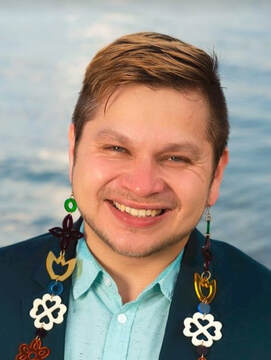
Abraham Francis
Abraham Francis est en possession d'un baccalauréat en microbiologie, 2014, et d'une maîtrise en ressources naturelles, 2019, de l'Université Cornell. Ses expériences passées comprennent l'autonomisation, l'engagement et la recherche communautaires avec le Conseil mohawk d'Akwesasne et une variété d'autres organisations communautaires. Sa thèse de maîtrise portait sur la recherche appliquée visant à élaborer une stratégie d'intendance bioculturelle des terres pour les revendications territoriales amérindiennes existantes et nouvellement réglées sur la réserve mohawk de St. Regis, à Akwesasne. Actuellement, il travaille en tant qu'agent des sciences de l'environnement pour le Conseil mohawk d'Akwesasne - Programme environnemental. Ce poste lui permet d'élaborer et de mettre en œuvre des projets qui sont inspirés et dirigés par les besoins de la communauté et influencés par ses intérêts de recherche. Ses intérêts de recherche se situent à l'intersection des études environnementales, des méthodologies indigènes, de l'engagement communautaire, de l'éducation, de la santé, des services sociaux, du droit et des fondations culturelles comme moyen d'autonomisation et de guérison au sein des communautés indigènes.
Abraham Francis est en possession d'un baccalauréat en microbiologie, 2014, et d'une maîtrise en ressources naturelles, 2019, de l'Université Cornell. Ses expériences passées comprennent l'autonomisation, l'engagement et la recherche communautaires avec le Conseil mohawk d'Akwesasne et une variété d'autres organisations communautaires. Sa thèse de maîtrise portait sur la recherche appliquée visant à élaborer une stratégie d'intendance bioculturelle des terres pour les revendications territoriales amérindiennes existantes et nouvellement réglées sur la réserve mohawk de St. Regis, à Akwesasne. Actuellement, il travaille en tant qu'agent des sciences de l'environnement pour le Conseil mohawk d'Akwesasne - Programme environnemental. Ce poste lui permet d'élaborer et de mettre en œuvre des projets qui sont inspirés et dirigés par les besoins de la communauté et influencés par ses intérêts de recherche. Ses intérêts de recherche se situent à l'intersection des études environnementales, des méthodologies indigènes, de l'engagement communautaire, de l'éducation, de la santé, des services sociaux, du droit et des fondations culturelles comme moyen d'autonomisation et de guérison au sein des communautés indigènes.

